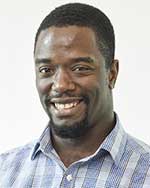Research Scientist Reflects on Skills Honed In Moffitt LINK Program
 "Thinking is my profession," says Dr. Glenn Simmons, Assistant Professor at the University of Minnesota Medical School. Dr. Simmons began his scientific career here at Moffitt Cancer Center back in May of 2003 when he joined the LINK program. The Leaders In New Knowledge (LINK) program was created to increase and retain minorities in science and create links between established scientists and aspiring scientists. With over 50 LINK participants, the program made a lasting impact which is evident in researchers like Dr. Simmons. "Being involved in the research enterprise at such an early stage gave me an idea of what research really takes," said Dr. Simmons.
"Thinking is my profession," says Dr. Glenn Simmons, Assistant Professor at the University of Minnesota Medical School. Dr. Simmons began his scientific career here at Moffitt Cancer Center back in May of 2003 when he joined the LINK program. The Leaders In New Knowledge (LINK) program was created to increase and retain minorities in science and create links between established scientists and aspiring scientists. With over 50 LINK participants, the program made a lasting impact which is evident in researchers like Dr. Simmons. "Being involved in the research enterprise at such an early stage gave me an idea of what research really takes," said Dr. Simmons.
Dr. Simmons’ lab at UM focuses on cancer biology, investigating the role lipids play in the tumor microenvironment. Their long-term goal is that their research will lead to new clinical trials that look at ways of modulating the immune response so that they can improve the standard of care for various types of cancers. Since late April however, his lab has been delving into COVID-19.
"My lab also has a health disparities focus so I was concerned very early on about what would happen if the testing for COVID was being implemented in a way that was going to inherently have some bias," said Dr. Simmons.
His lab developed a model that can determine the approximate number of people in the community that is infected with COVID who are not being accounted for by the clinics. This could lead to the unknowing spread of the disease.
According to Dr. Simmons, there are multiple reasons these people may be missed. "You have to pay for the test, you have to get to a certain place to have the test done, and the people who are administering the test have to agree that you need to be tested based on whatever protocol that they’re following or whatever inherent biases they may have." Dr. Simmons’ model is now being employed across 44 different cities in Minnesota.
Dr. Simmons recently received his first mentorship award, nominated by one of his student trainees for mentor of the year. Winning the award was important to him as he states, "I feel like the reason I made it to where I am is because I had a research mentor like Dr. Scott Antonia and a postdoc that was directly supervising my work, Dr. Terry Hunter. Dr. Hunter was super nurturing of the fact that I had no idea what I was doing, and she helped me understand that with a little more focus everything else will make sense."
When asked what skills he developed during his time at Moffitt that are now important for him as a faculty member, Dr. Simmons said two skills, in particular, aided him. Getting comfortable with failure and having multiple opportunities to discuss his research with junior and senior faculty. Being able to present his research confidently was a major benefit and Moffitt was a big part of helping to shape that aspect of his development as a scientist.
Lastly, Dr. Simmons had some words of advice for trainees, "Sometimes we get into an echo chamber - we want things to reaffirm what we already think. Sometimes that’s good and a lot of times it’s really bad. Accept that all realities are true at the same time and therefore find both sides of an argument. Listen to both pros and cons and then ask yourself, how do you want to live your life? Spend enough time with yourself to find out who you really are and who you want to be."
Where Are They Now
- Office of Postdoctoral Affairs
- Office of Graduate Affairs
- Office of Undergraduate and Visiting Scholar Affairs
- What We Provide
- Contact Us
- Diversity in Training and Education
- About Tampa Bay
-
News
- PhD Student Julia Billington Selected to Deliver Oral presentation at AACR Conference 2024
- Team Members Share Experiences at National Postdoctoral Association Conference 2024
- Grad Student Appreciation Week 2024
- Dr. Ranjita Poudel Selected as a mHealth Scholar for Hybrid 2024 mHealth Training Institute
- Moffitt Postdoctoral Association News Recap
- State College of Florida Students Visit Moffitt Labs
- PhD Student Olabisi Osunmakinde Wins 2024 Graduate Research Symposium Presentation at USF
- PhD Student Mostafa Nasr Receives AACR Scholar-in-Training Award
- Welcome New Postdoctoral Fellow, Dr. Olivia Rose
- Moffitt Hosts Tampa Bay Chamber Collegiate Leadership Program
- Moffitt Researchers participate in the Great American Teach-In
- Dr. MacLean Hall, 2023 Outstanding Thesis and Dissertation Award
- 2024 PhD Student Visit
- 2023 Junior Scientist Research Partnership Awards
- Moffitt Innovators of Tomorrow Symposium Welcomes Its First Recruited Postdoc, Dr. Hayley du Bois
- Tumor Busters Raise Money for Miles for Moffitt
- Dr. Paulo Rodriguez Awarded W. Jackson Pledger Researcher of the Year
- RET Halloween Party and Pumpkin Carving Contest
- Ted Couch Lecture Welcomes Dr. William Kaelin
- Student Receives NCI Predoctoral to Postdoctoral Fellow Transition Award
- 2023 Junior Scientist Retreat
- 2023 Annual Student Welcome Reception
- 2023 Cancer PhD Outstanding Research Award Recipients
- 2023 Moffitt Scientific Symposium Recap
- Moffit and Saint Leo University Partner at Event
- Where Are They Now
